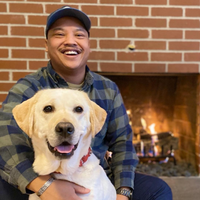Master's in Emergency & Disaster Management
Ethan Faxon

Look at Ethan Faxon’s photo and you’ll notice that the big yellow lab with the joyful grin takes up about as much space as he does.
And that’s the way Faxon wants it.
“So that’s Cooper,” says the former U.S. Army Specialist, who lives near Albany, N.Y. “I really want to incorporate him because he’s been such a big help in getting me here. He was my assigned service animal, and I thought that he should also be embraced in this moment.”
The moment Faxon is referring to occurred earlier in 2023 when he was selected as a finalist for the Presidential Management Fellows (PMF) Program, the federal government’s premier leadership development program. The two-year fellowship matches outstanding graduate students with federal opportunities in order, PMF says, “to recruit and develop a cadre of future government leaders from all segments of society.”
The Long Road Back
A student in the Master’s in Emergency & Disaster Management program, Faxon is interested in emergency management at all levels and how various agencies coordinate their responses. He has come a long way since 2011 when he was injured in a vehicle rollover caused by a rocket-propelled grenade while serving as a U.S. Army Military Police Officer in Afghanistan. Originally given a less than 1 percent chance to live, he beat those odds, awakening from a medically induced coma, walking within a week, and returning to work in about a month.
“The doctors don’t know how I recovered so fast,” he says.
The less-visible injuries took longer to heal. Diagnosed with a traumatic brain injury and PTSD, he embarked on a years-long rehabilitation program that got a significant boost about seven years ago when he was introduced to a “rambunctious little puppy” that he had to train so that the puppy could one day help him.
In those early days, Cooper learned how to pick up objects for Faxon. And, when Faxon went off to college at the University of New Hampshire, Cooper went with him. Among the problems Faxon initially faced was social anxiety and encountering people in groups. Cooper helped with that as well.
“He cleared rooms, which was very remarkable,” Faxon says. “So, when I went into a classroom at times, I would let him go first; and, if the room was clear, he would give out a bark. But if it wasn’t, he would come back and just sit in front of me. I would know mentally what I was being prepared for.”
By the time Faxon enrolled in Georgetown’s Emergency & Disaster Management program in 2021, he had recovered so much that Cooper’s services were no longer needed. “So, he’s recently retired and enjoying retirement life,” Faxon says.
A Call to Service
Being around Cooper for seven years taught Faxon a lot about empathy and gratitude. But it’s not like he didn’t possess these qualities before. He comes from a family dedicated to serving others. His father retired as a full-bird colonel after 30 years in the United States Marine Corps, then worked in Ohio in county emergency management. His brother, also a Marine veteran, is a volunteer firefighter and EMT, as well as his oldest sister, another volunteer firefighter.
“It just really goes back to helping others,” Faxon says. “In high school, I was an EMT, so I always had that in my bloodline.”
As an undergraduate, Faxon worked as an intern with the Manchester (N.H.) Fire Department’s Office of Emergency Management. And, while he is working on his master’s at Georgetown, he is volunteering as a disaster duty officer for the Eastern New York Region of the American Red Cross, which he describes as “the volunteer counterpart to the program manager.”
For his Capstone, Faxon will be researching how emergency management agencies at various levels plan for debris removal after an emergency. Although much has been written about removing debris post-disaster, he says, there is less on how agencies should prepare. He is particularly interested in how local agencies plan for these emergencies and coordinate with state and federal offices.
“If the local level can handle the emergency, then it’s just a routine emergency,” Faxon says. “And how do we go from there to educate, to provide robust capabilities, to enhance community resilience so that these emergencies don’t cross over to a disaster, where they require state or federal assistance?”